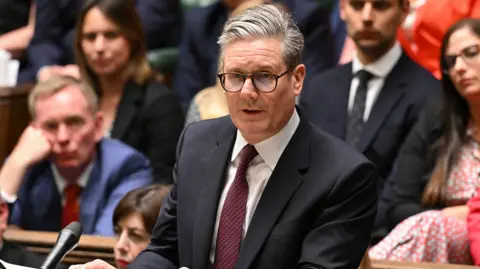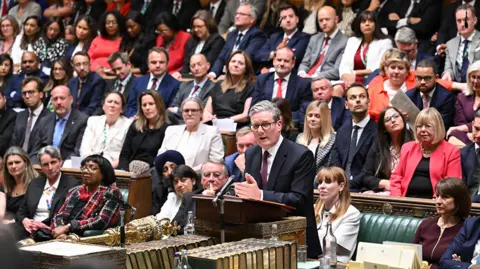King's Speech latest: Starmer pledges growth but warns of 'no quick fix'
Sir Keir Starmer has said his plan for government would "take the brakes off Britain" and put the country on the "path of national renewal".
Speaking after the King's Speech, which set out 39 bills the government hopes to pass, the new prime minister said there would be "no quick fix" and warned against the "snake oil charm of populism".
At the heart of his plan to boost the country's economic growth are changes to the planning system, aimed at making it easier to build houses and infrastructure.
Proposals to give local leaders more powers, bring the railways into public ownership and increase workers' rights were also included.
Some proposed pieces of legislation, first introduced by the last government, have been revived including Rishi Sunak's gradual smoking ban and the introduction of a football regulator.
However, there were some notable omissions, with no mention of scrapping the two-child benefit cap - which some Labour MPs and the SNP have been pushing for.
Jeremy Corbyn, the former Labour leader and now independent MP for Islington North, joined the calls to "do it now" and suggested the announcement of a child poverty taskforce was a way to "just delay it".
He said: "Why not do it now and just say quite simply, 'we're going to end the cap'?
"It's simply cruel and nasty to say that the third, fourth or fifth child of a family is less valuable than the first two."
A bill implementing Labour's manifesto promise to give 16 and 17-year-olds the vote in general elections was also missing but ministers say this will be introduced at a later stage.
Green Party MP Sian Berry said she was disappointed as "young people need a real voice", adding she believed they would help strengthen the calls to remove the two-child cap.
Labour backbencher Rebecca Long Bailey, a former shadow cabinet member, also called on her party to urgently "settle the debt of honour we owe" to women born in the 1950s who suffered "pension injustice", known as the Waspi women.
The speech was delivered by King Charles - accompanied by the traditional pageantry - but was written by the new Labour government, elected on 4 July with a big majority of 174.
Following the King’s Speech, Conservative leader Mr Sunak said his party would not oppose the government “for the sake of it” but would hold it to account on its election promises.
On Labour’s proposed changes to planning rules, he said everyone wanted to see the process speeded up but warned that “a system that does not allow local people to have a say will damage public consent for more housing in the long term”.
Liberal Democrat deputy leader Daisy Cooper welcomed a promise to reform the Mental Health Act but said she wanted to see more ambition on health and social care.
During the election campaign, the think tank, the Institute for Fiscal Studies, warned that the future government would have to choose between raising taxes, cutting public services or borrowing more.
Labour hopes to be able to avoid these politically unpalatable options by boosting growth, which has been sluggish for several years.
The King's 12-minute speech was littered with phrases such as "securing economic growth", "a key driver of economic growth" and "local growth plans".
In the government's briefing notes, it argued that one of the "major brakes" on economic growth has been the current planning regime and used the King's Speech to introduce its Planning and Infrastructure Bill.
The bill, which will apply to England, Wales and, in parts, to Scotland aims to accelerate the building of homes and infrastructure.
Under the government's plans, the capacity of local planning departments will be boosted and the process for getting consent to infrastructure projects such as solar farms or grid connections simplified.
The government says in future local communities will only be to able influence how, not if, new houses are built.
Given Labour's hefty majority in the House of Commons, the planning bill is likely to get through Parliament.
However, new developments could face vigorous opposition from the local communities affected by building projects.
Other measures the government hopes will bolster economic growth include its English Devolution Bill.
The bill would give local leaders more powers over transport, skills and employment and make it easier to request further powers.
The Better Buses Bill would allow local politicians to create publicly-owned bus operators.
One bill would set up a National Wealth Fund to boost investment in infrastructure and green industry. Another will establish Great British Energy, a state-owned company to invest in renewable energy.
When Mr Sunak called the general election in May, several government bills progressing through Parliament had to be ditched.
The Labour government has now said it will reintroduce some of those pieces of legislation including the Tobacco and Vapes Bill, which bans people born on or after 1 January 2009 from being able to buy cigarettes.
The Terrorism (Protection of Premises) Bill would establish Martyn's Law, requiring premises to mitigate the impact of a potential terrorist attack.
The measure has been campaigned for by Figen Murray, the mother of Martyn Hett, one of the 22 people killed in the 2017 terrorist attack on Manchester Arena.
Downing Street says at least six of the bills outlined in the King's Speech will be introduced to Parliament this week.
 UK Parliament
UK ParliamentResponding to the speech, Reform UK deputy leader Richard Tice said the government's policies would lead to higher taxes and more regulation.
Green Party MP Ellie Chowns said she wanted to see "bolder action" on improving building standards and introducing rent controls.
The SNP's Stephen Gethins said the "biggest thing pulling back growth" was Brexit and criticised the government for not using its big majority to reverse the "hard Tory Brexit".
He also criticised the government for not removing the two-child benefit limit.
The cap prevents households on universal credit or child tax credit from receiving payments for a third or subsequent child born after April 2017.
During the debate following the King's speech, former Labour shadow chancellor John McDonnell said ditching the limit would lift 300,000 children out of poverty.
Sir Keir has previously said he understood the objections to the cap but that removing it was currently unaffordable.
After the King's Speech, the government announced a taskforce to deliver a child poverty strategy, to be led by Work and Pensions Secretary Liz Kendall and Education Secretary Bridget Phillipson.
 UK Parliament
UK ParliamentAmong other measures, the King's Speech also included:
- the Renters' Rights Bill banning so-called no fault evictions and extending safety rules to private tenants
- the Water (Special Measures) Bill making the bosses of private water companies personally liable for lawbreaking
- the Border Security, Asylum and Immigration Bill allowing police to use counter-terror powers to tackle gangs smuggling migrants into the UK
- the draft Conversion Practices Bill introducing new restrictions on "abusive" practices intended to change people's sexual orientation or gender identity
- the House of Lords (Hereditary Peers) Bill removing hereditary peers from the upper chamber.
